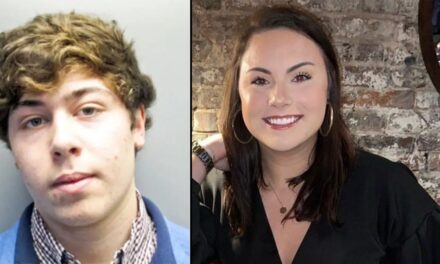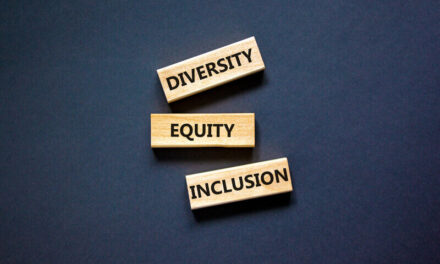As Breast Cancer Awareness Month in October draws to a close, it’s a reminder that breast cancer is more than a pink ribbon, shirt, or hair. In solidarity, Kristin Cerf, president and CEO of Blue Shield of California Promise Health Plan, cut and donated her hair to honor this cause.
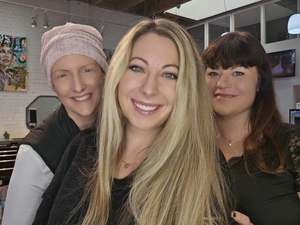
The “before” photo. Kristen Cerf stands with her friend and stylist Sarah Altieri at Spanish Fly Hair Garage, Sacramento
Why did you decide to cut your hair?
A close friend of mine was diagnosed with breast cancer earlier this year and I wanted to do something to visibly support her. Hearing about a cancer diagnosis is scary, especially for the person receiving the news and those who love them. Luckily the cancer was found early, so my friend has the best chance at a good outcome. Cutting my hair is not only doing something to show love and support for my friend, it’s also going to a good cause: to create wigs for children suffering from hair loss due to illnesses.
I haven’t had short hair since the sixth grade, but this is so much more than a haircut. It’s a symbol of hope. I’ve always wanted to donate my hair to an organization that makes no-cost hair prostheses for children going through hair loss due to anything from alopecia to cancer. What a lot of people don’t realize is most wigs are made for adult heads and are not always hypoallergenic, which is important for children who have sensitive skin due to their illness. And they could fall off, which doesn’t work well for a child. To see the before and after photos of these children, you just feel their joy at seeing themselves with hair and the self-confidence it gives them.
I was able to donate more than 11 inches of my hair to an organization called Children with Hair Loss. They’re an amazing organization that provides customized human hair replacements and care kits to children at no cost to the family.
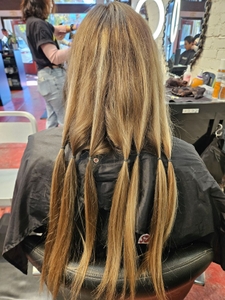
During the haircut
How is your friend doing now?
She’s doing so well! She completed 16 chemotherapy infusions over five months like a warrior and is getting ready for surgery. She’s so strong, I know she’s going to come through this beautifully.
How does your friend’s diagnosis have an impact on your role as a leader in the health care space?
Every time one of us has a friend or family member go through a health crisis it makes you think on a personal level, how can we do more? That gets to the root of our mission at Blue Shield of California and Blue Shield Promise and it’s a challenge we all need to rise up to. Cancer sucks. Treatment is so hard. I think so much of it is unintentionally dehumanizing and to know that anyone feels the least human at a time when they need the most love and support breaks my heart. I also think about what we can be doing as a health plan to make it easier for people – especially our Medi-Cal members – to navigate their care. What additional support can we give them, and how can we be part of the solution to finding a cure for this or any other disease, like diabetes or cardiovascular disease? What do we know about people: where they live, the languages they speak, the support they may need in their lives beyond a medical appointment, and difficulties they may have getting to all these appointments? How do we normalize talking about things like cancer at work and at home, and how do we provide better, meaningful support for folks undergoing treatment?
I certainly don’t have all the answers. It’s important we work together to address these critical questions. In the short term, we need to remind the women in our lives to stay up to date on preventive screenings. Mammograms can save lives by detecting cancer early. I urge all women who are 40 years or older to make their mammogram appointment a top priority every year, please!
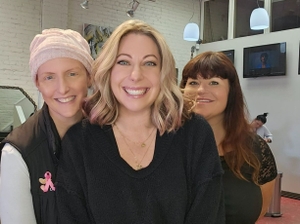
The “after” photo
What is Blue Shield Promise doing to reduce breast cancer morbidity?
Blue Shield Promise holds mobile mammography events in Los Angeles and San Diego counties year-round to help address disparities in breast cancer screening and ensure that all women – regardless of their socioeconomic status or geographic location – have equal access to quality healthcare services. From March through September this year we screened 365 women at our mobile sites, the majority of whom are Hispanic/Latina or Black/African American, and we’ll reach even more at mobile mammogram events scheduled through the end of this year.
According to the American Cancer Society, approximately 1 in 8 women will be diagnosed with invasive breast cancer in her lifetime. Statistically, 1 in 5 Black women with breast cancer are diagnosed with triple-negative breast cancer, which is harder to treat, and at a higher rate than any other racial or ethnic group. Hispanic women are also more likely than white women to be diagnosed with breast cancer at later stages when it is more difficult to treat. If we can improve screening and detection rates, we can move the needle on these numbers and create more equitable outcomes.

